Aosta, The Rome of The Alps
30th April 2020 | James Cove, PlanetSKI editor
Last modified on May 15th, 2021
Regular readers will know PlanetSKI was based in the historic Italian city in the heart of the Alps last winter. Then coronavirus struck, but not before we had been on an historical tour of the ancient alpine city and fallen in love with the city and its surrounding ski resorts.
It was not quite the way I had expected to leave Aosta.
In fact I should still be there as I had a lease on a flat/office until the end of April and was likely to extend it into May.
There was ski touring and high altitude glacier skiing in Cervinia to be done with some cycling, hiking and general chilling after a busy winter.
Spring in the Alps is my favourite time of the year.
But on March 8th Italy went into full lockdown as I left – quickly in case the borders shut.
https://www.facebook.com/planetski/videos/1728544537287563/?eid=ARBzLOURz91zQps5_5jvMnY7gClB4qw9av8OerSxRyWSk2KwOBbWpgYA-WHlgaVsScUaVW7M5UNXmv8Z
I headed to Chamonix for a couple of days, where I didn’t ski, and then I left the Alps altogether.
I had decided, before the authorities shut all the resorts, that they were far too dangerous places to be.
The invisible coronavirus was spreading relentlessly and ski resorts were less then ideal places to be.
Most thought I was over-reacting.
https://www.facebook.com/planetski/videos/1074047102958961/
Leaving my winter home in Aosta was a surreal experience and I left behind the alpine city I had grown to love with two months remaining.
Before long a field hospital would be built where I parked my car to take the lift to ski in Pila.
However this was, and is, just another chapter in the town’s rich history.

Aosta, Aosta Valley, Italy. Image © PlanetSKI.
It began many centuries earlier.
Aosta was settled in pre-historic times and became a Roman town in 25BC.
It is an important trade route via the Grand St Bernard Pass into Switzerland and the Petite St Bernard Pass into France.
It is on a route connecting southern Europe with northern Europe.
The Romans defeated the Salassians to establish the city 25 years before Christ was born.
The Arch of Augustus was constructed and it remains to this day.
It is the start of any modern-day tour of Aosta.
It is a single round arch, measuring 8.29 metres in width.
Though it looks rather odd with its current neighbour (there was a dinosaur exhibition on in the city at the same time).
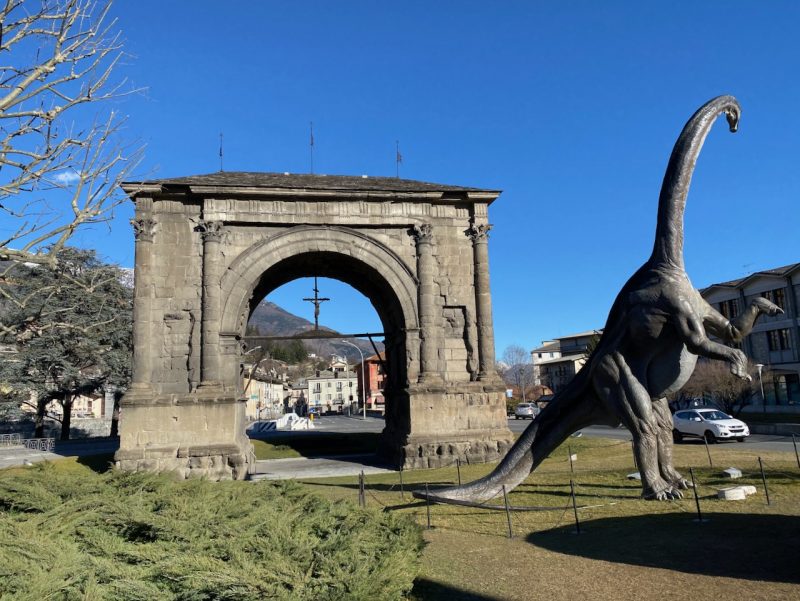
Aosta, Aosta Valley, Italy. Image © PlanetSKI.
Then it is a gentle stroll down the main street and a sharp turn to the right.
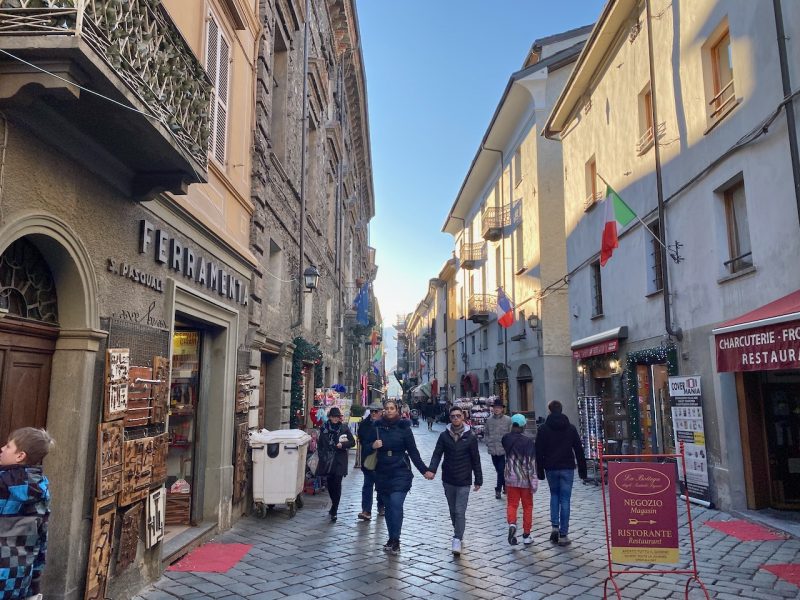
Aosta, Aosta Valley, Italy. Image © PlanetSKI.
First up a lime tree.
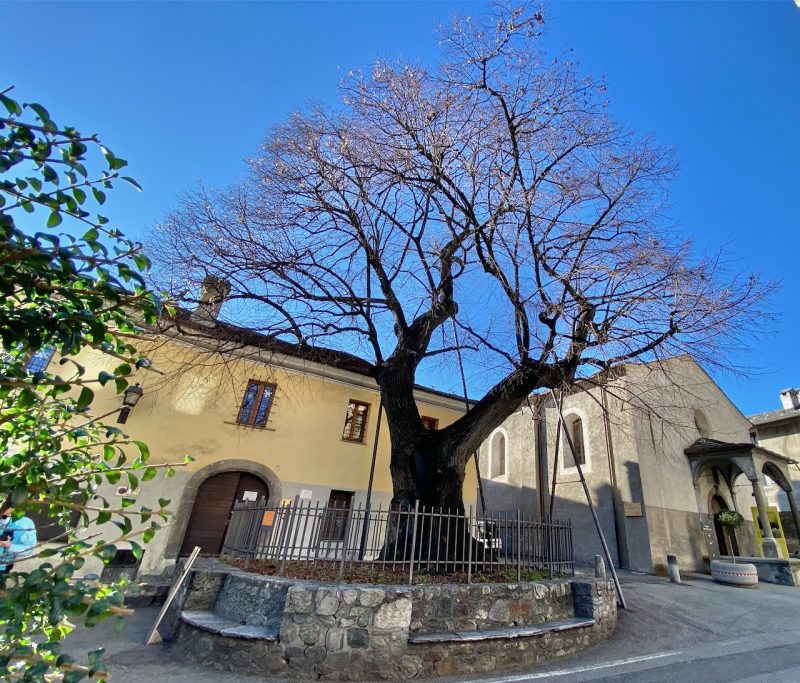
Aosta, Aosta Valley, Italy. Image © PlanetSKI.
But not just any old lime tree.
It has been sprouting branches since the first half of the 16th century and scientific testing indicates it began to grow sometime between 1530 and 1550.
Then it was in into this building, built in 1470, for some frescos.
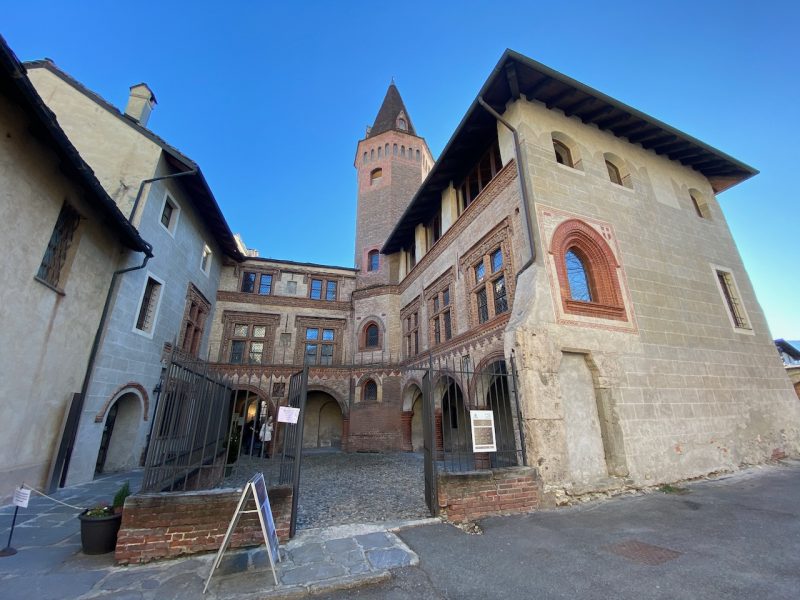
Aosta, Aosta Valley, Italy. Image © PlanetSKI.
Now, lets be honest, some historical tours can be a bit, er, dull.
With a guide waffling on forever with an avalanche of dates, facts and information that just become a bit of a blur.
Well, not so with Dolores Jurillo.
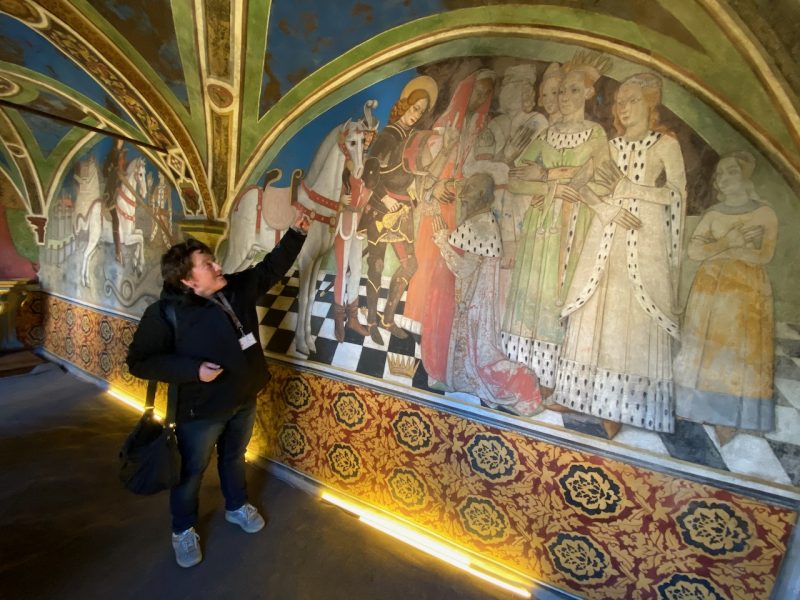
Aosta, Aosta Valley, Italy. Image © PlanetSKI.
“Look at this, it really is pretty dreadful and a very poor example of this style of painting. You will see some much better ones elsewhere,” Dolores said.
She tells it like it is.
“Horses do not have such eyelashes, it looks more like a cartoon.”
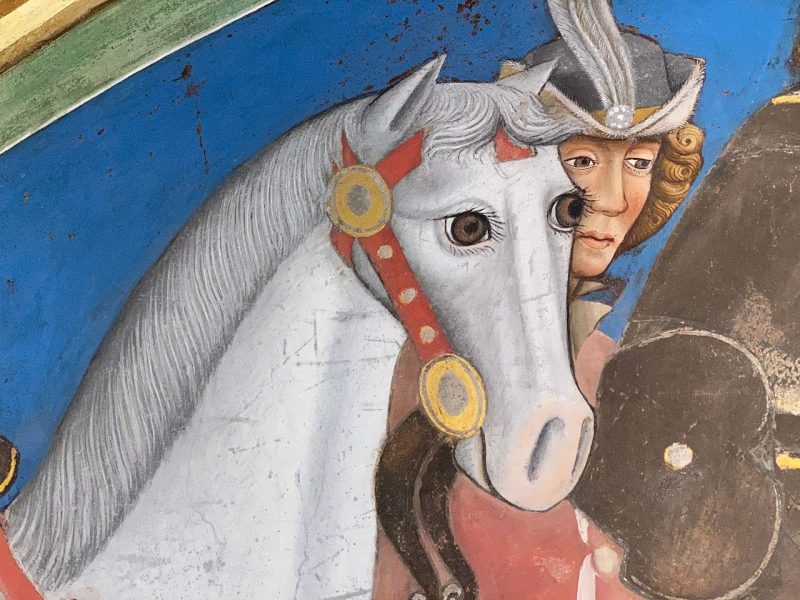
Aosta, Aosta Valley, Italy. Image © PlanetSKI.
“The frescos haven’t even been finished and just look at the hands.”
“There is no movement and the work hasn’t even been signed.”
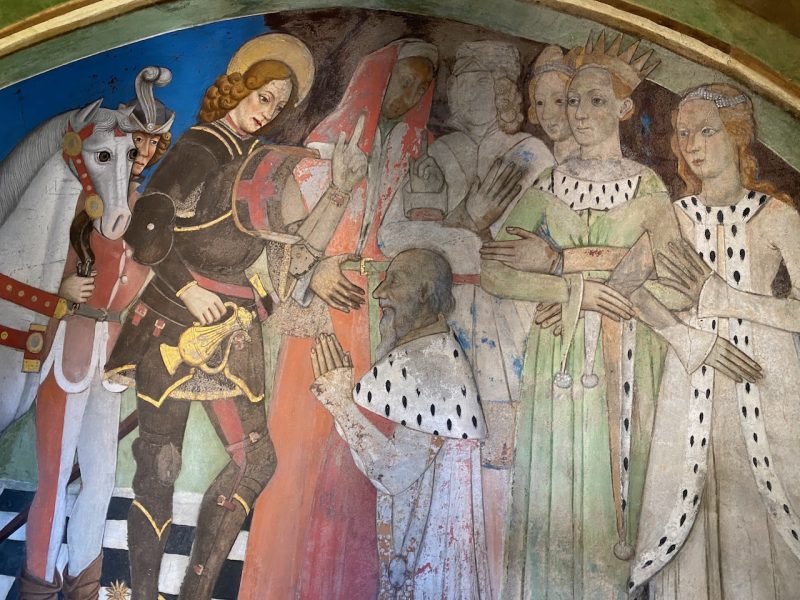
Aosta, Aosta Valley, Italy. Image © PlanetSKI.
I could only agree, but I did like the colours.
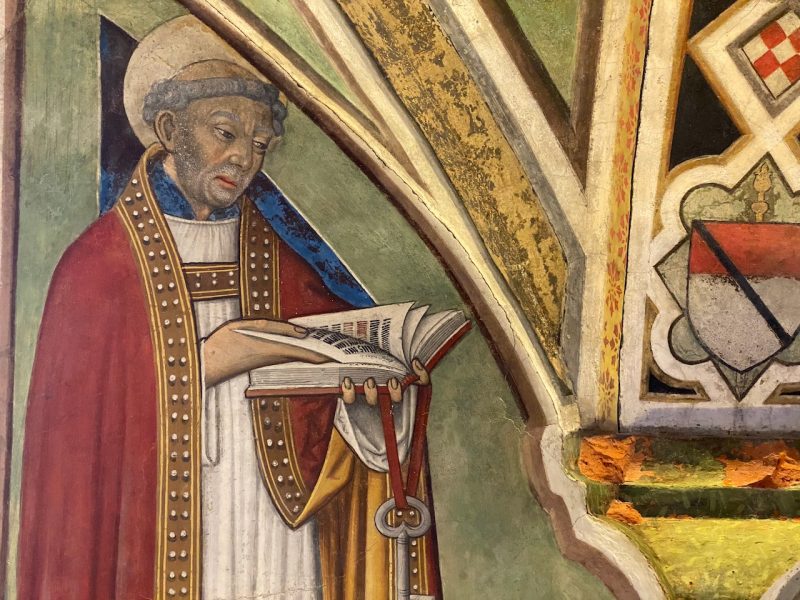
Aosta, Aosta Valley, Italy. Image © PlanetSKI.
She was not over-impressed with the dragon either.
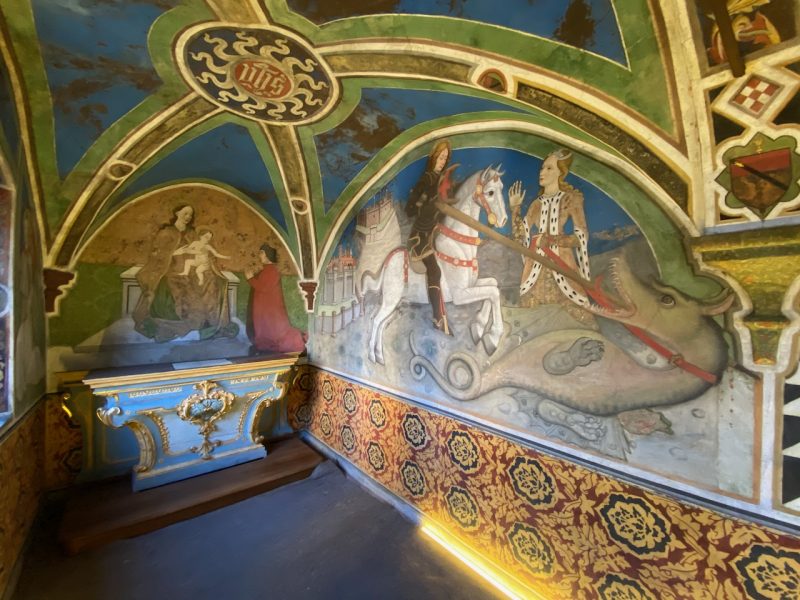
Aosta, Aosta Valley, Italy. Image © PlanetSKI.
Dolores was a fabulous guide for my tour.
Entertaining, honest and very knowledgeable.
“Quite beautiful?” she said as she showed us the nearby cloisters that were built in 1132.
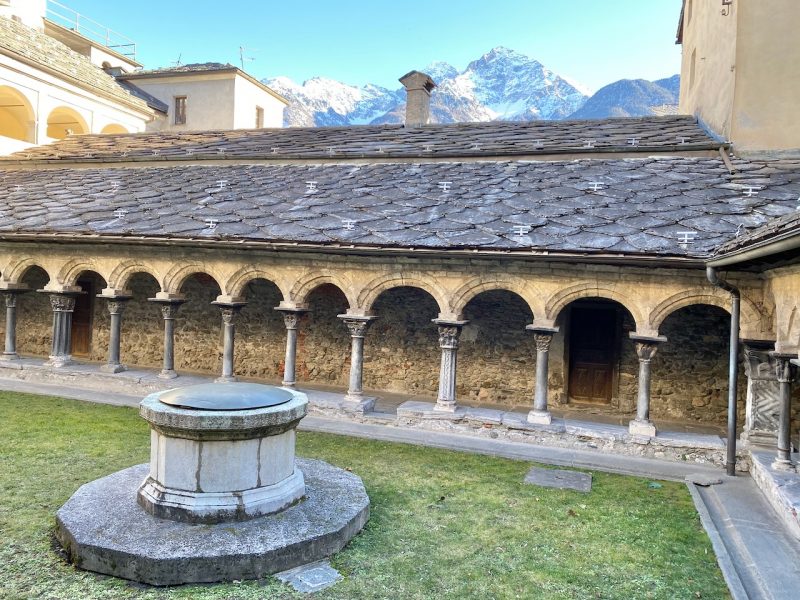
Aosta, Aosta Valley, Italy. Image © PlanetSKI.
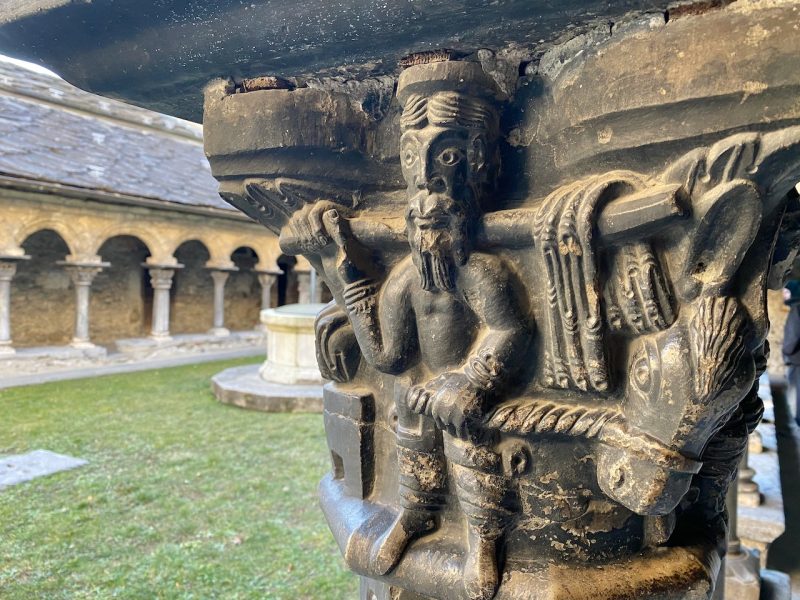
Aosta, Aosta Valley, Italy. Image © PlanetSKI.
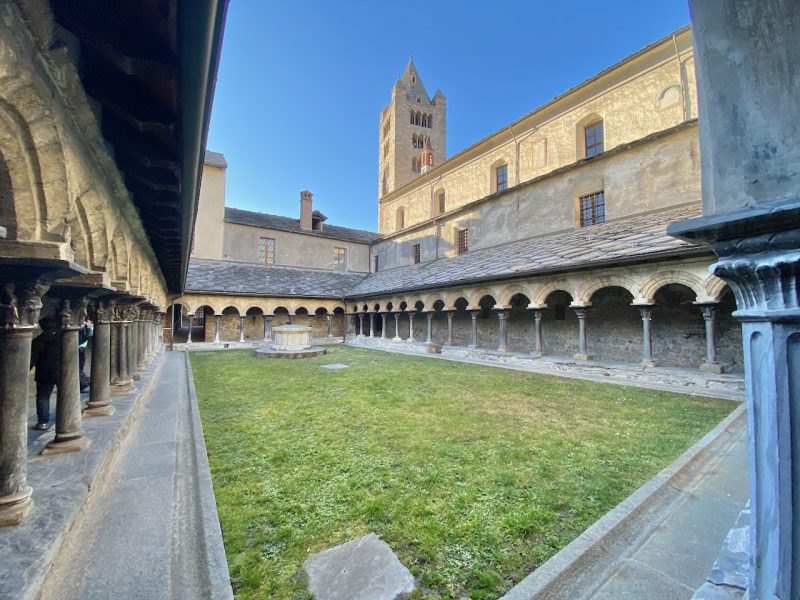
Aosta, Aosta Valley, Italy. Image © PlanetSKI.
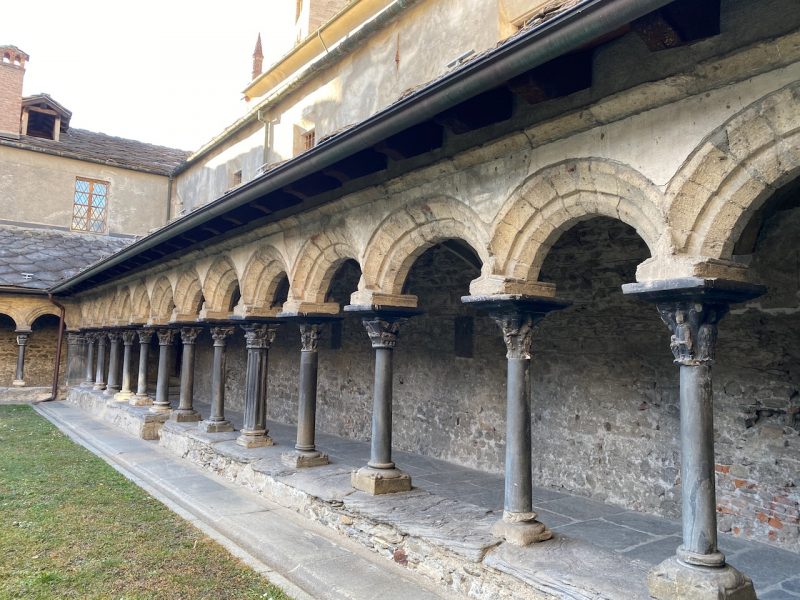
Aosta, Aosta Valley, Italy. Image © PlanetSKI.
Then it was back to the Roman ruins, though the Praetorian gate is hardly a ruin.
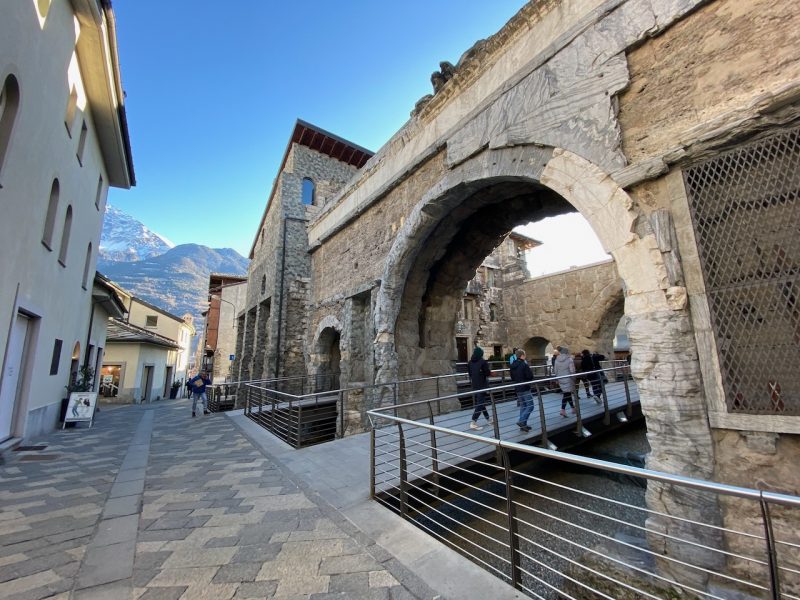
Aosta, Aosta Valley, Italy. Image © PlanetSKI.
It provided one of the main access points into the city.
It is still used today as a meeting point.
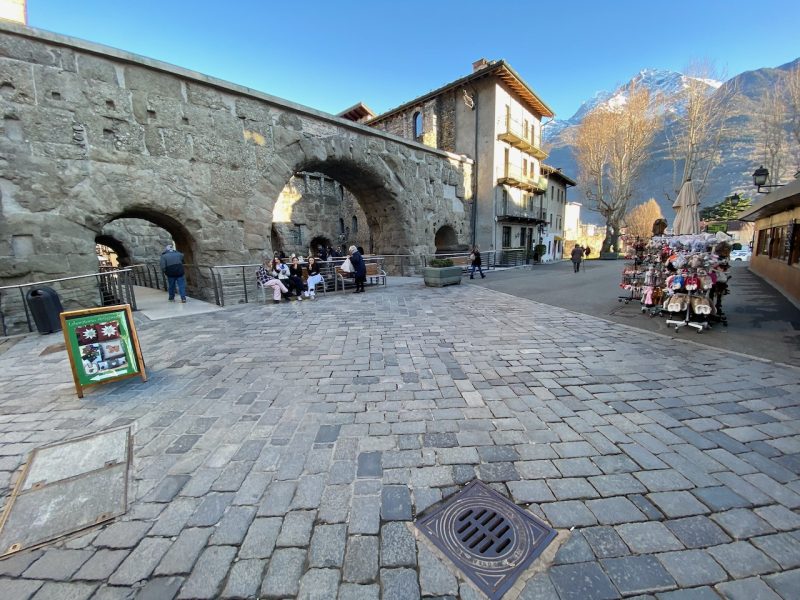
Aosta, Aosta Valley, Italy. Image © PlanetSKI.
And then my favourite site.
https://www.facebook.com/planetski/videos/222331075724808/?eid=ARAD_7De9Rqrrvi5UIeF7QoUXjDDvvD7lwBe5hhwTF9pkAO8MCirPGQyDdtfY7nCeogS_bb38utSDFTY
The structure is 22m tall and dates from the late reign of Augustus.
It occupied an area of 81m by 64m and held to 4,000 spectators.
The remains are simply stunning with the mountain backdrop.
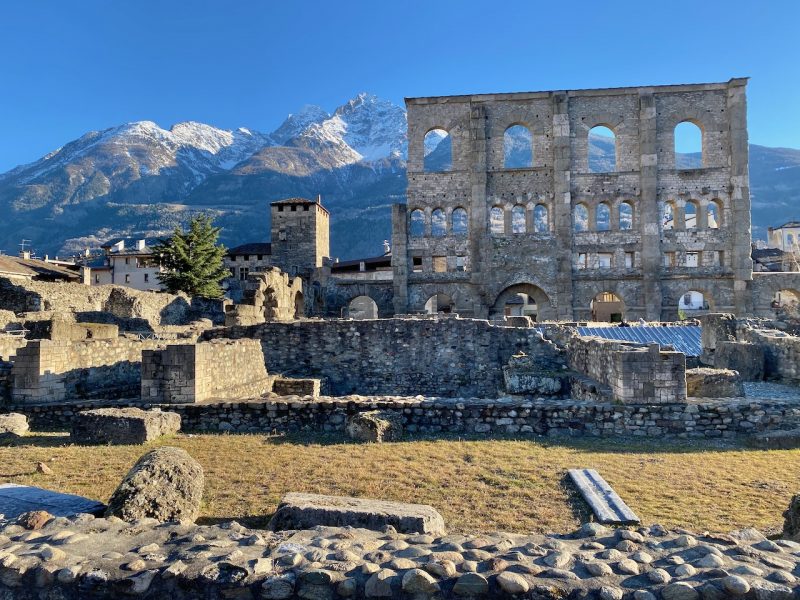
Aosta, Aosta Valley, Italy. Image © PlanetSKI.
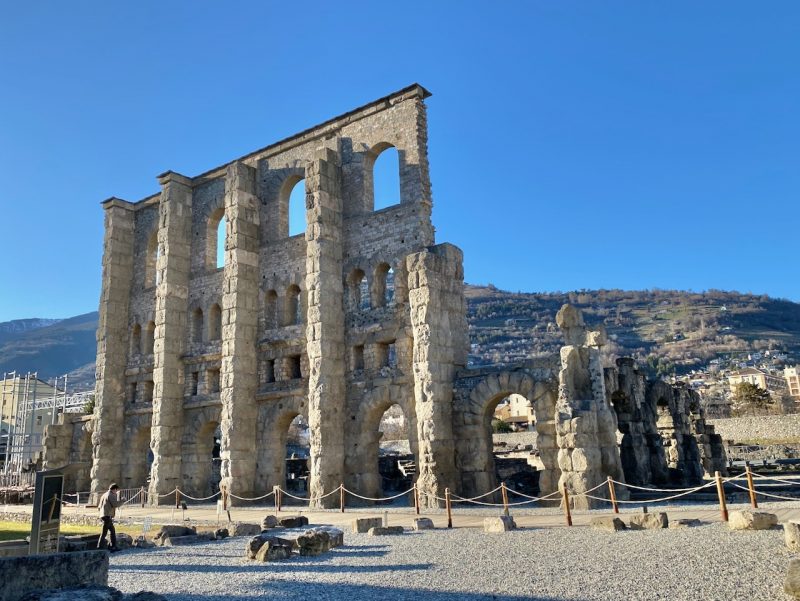
Aosta, Aosta Valley, Italy. Image © PlanetSKI.
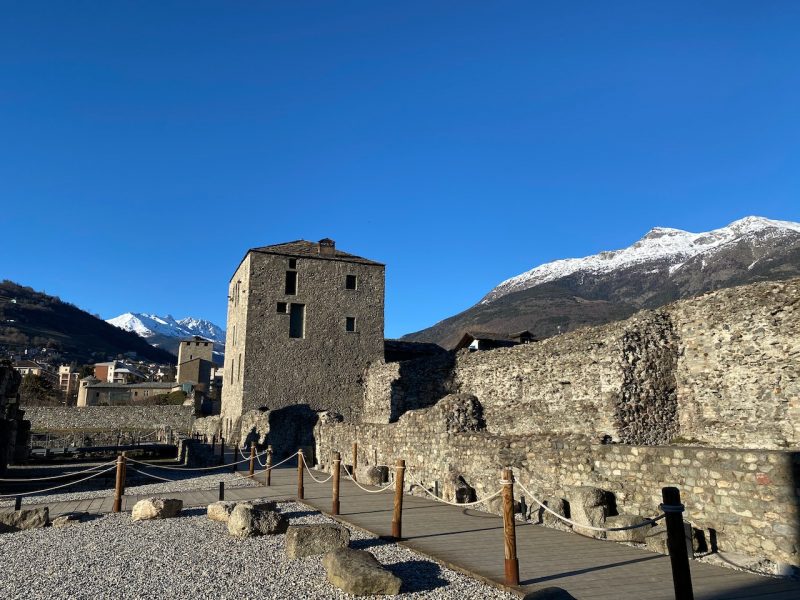
Aosta, Aosta Valley, Italy. Image © PlanetSKI.
No tour of the city is complete with loitering at the Town Hall, or Hotel de Ville, for a few moments.
The city used to be under French rule and became Italian under the unification of Italy in 1861.
Children still learn both French and Italian at school and all public officials have to be able to speak French.
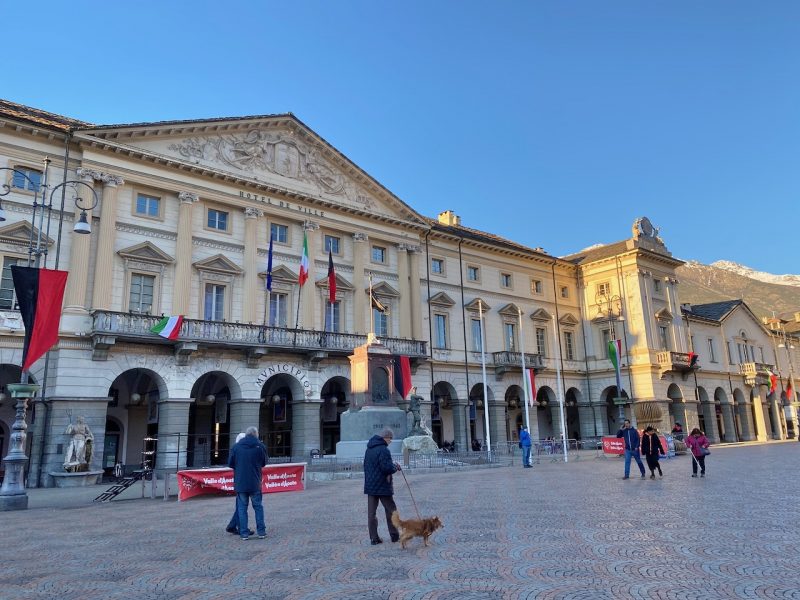
Aosta, Aosta Valley, Italy. Image © PlanetSKI.
And then there is the main cathedral.
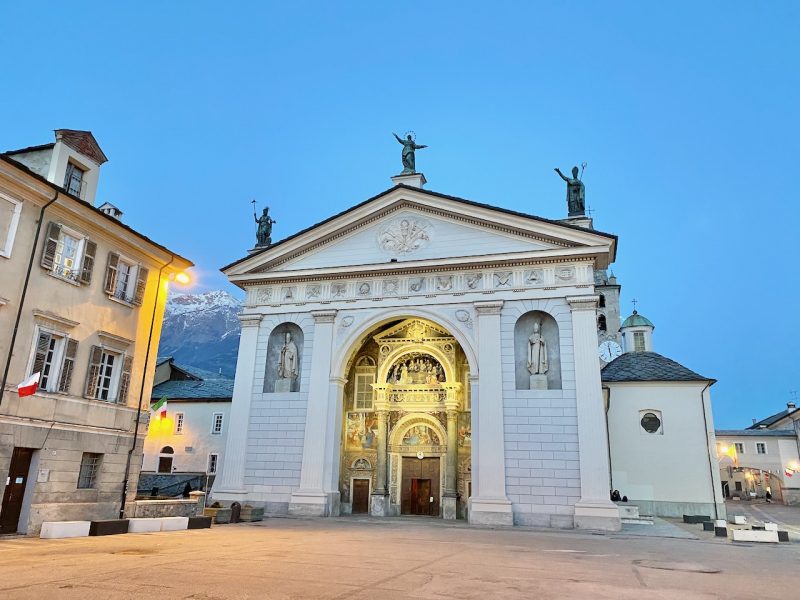
Aosta, Aosta Valley, Italy. Image © PlanetSKI.
The Cathedral was built in the 4th century and replaced in the 11th century
It comes complete with its underground Roman ruins – the cryptoporticus.
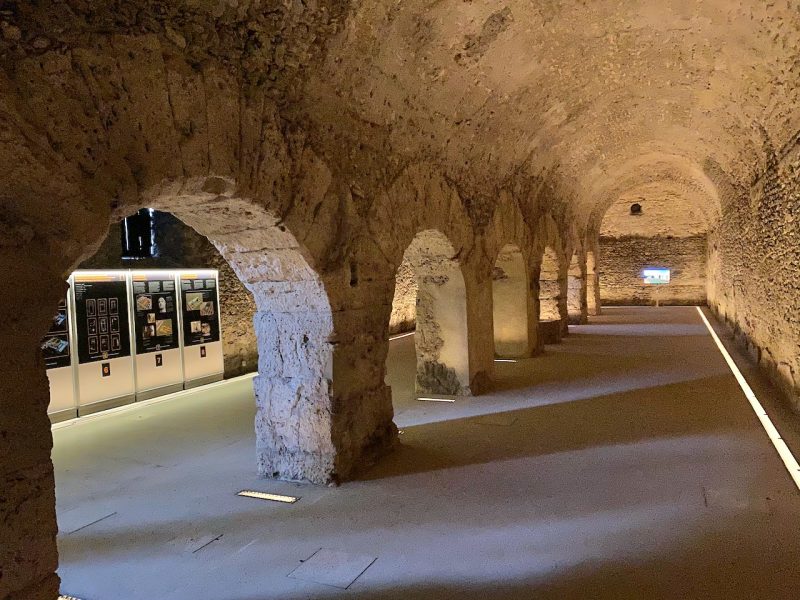
Aosta, Aosta Valley, Italy. Image © PlanetSKI.
The city and its surrounding areas are awash with ancient roads, fountains, wash-houses, votive chapels, sundials, historical houses and courtyards in abundance.
I urge you to visit at your earliest convenience and when the current coronavirus restrictions are lifted.
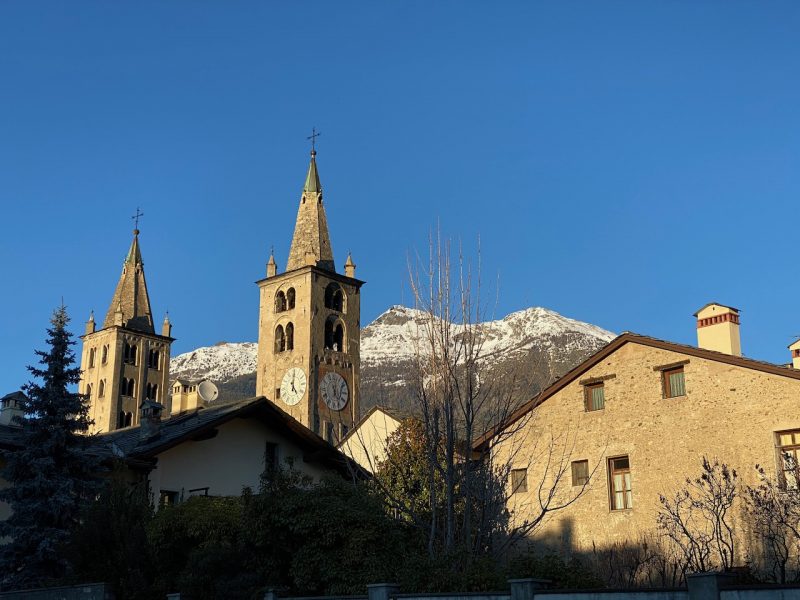
Aosta, Aosta Valley, Italy. Image © PlanetSKI.
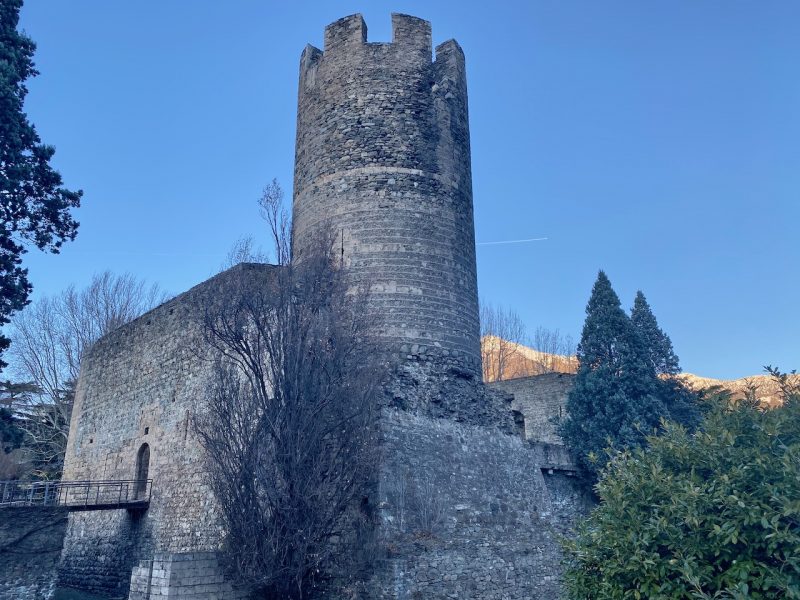
Aosta, Aosta Valley, Italy. Image © PlanetSKI.
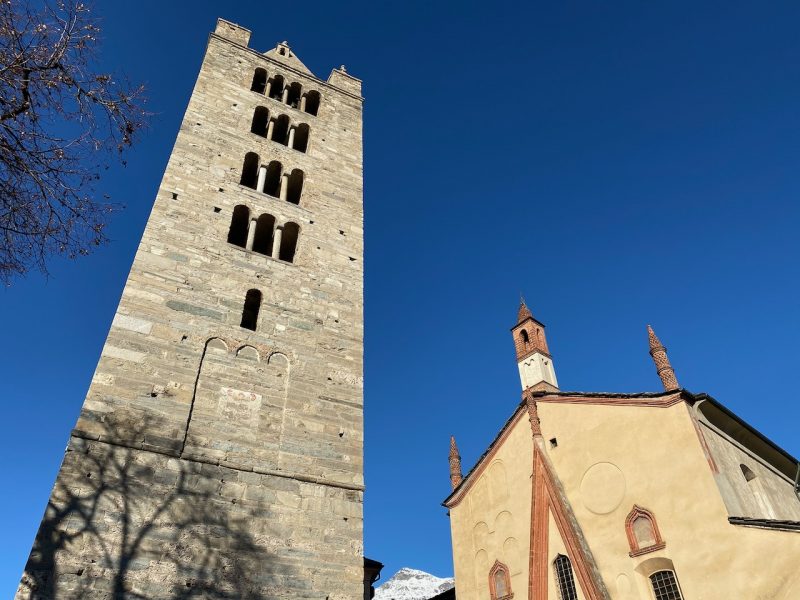
Aosta, Aosta Valley, Italy. Image © PlanetSKI.
If you go to any of the surrounding ski resorts then I thoroughly recommend a visit to Aosta.
All things being equal PlanetSKI will be back in Aosta next winter and we have already re-booked our apartment/office.
The skiing’s not too bad either:
PlanetSKI arrives in Aosta for 3-months stay
Avoiding the crowds in the Aosta Valley: Torgnon
Avoiding he crowds in the Aosta Valley: Crevacol
Blue skies and powder after the storm
PlanetSKI snow report
From Aosta to Chamonix

Aosta Valley, Italy. Image © PlanetSKI.










